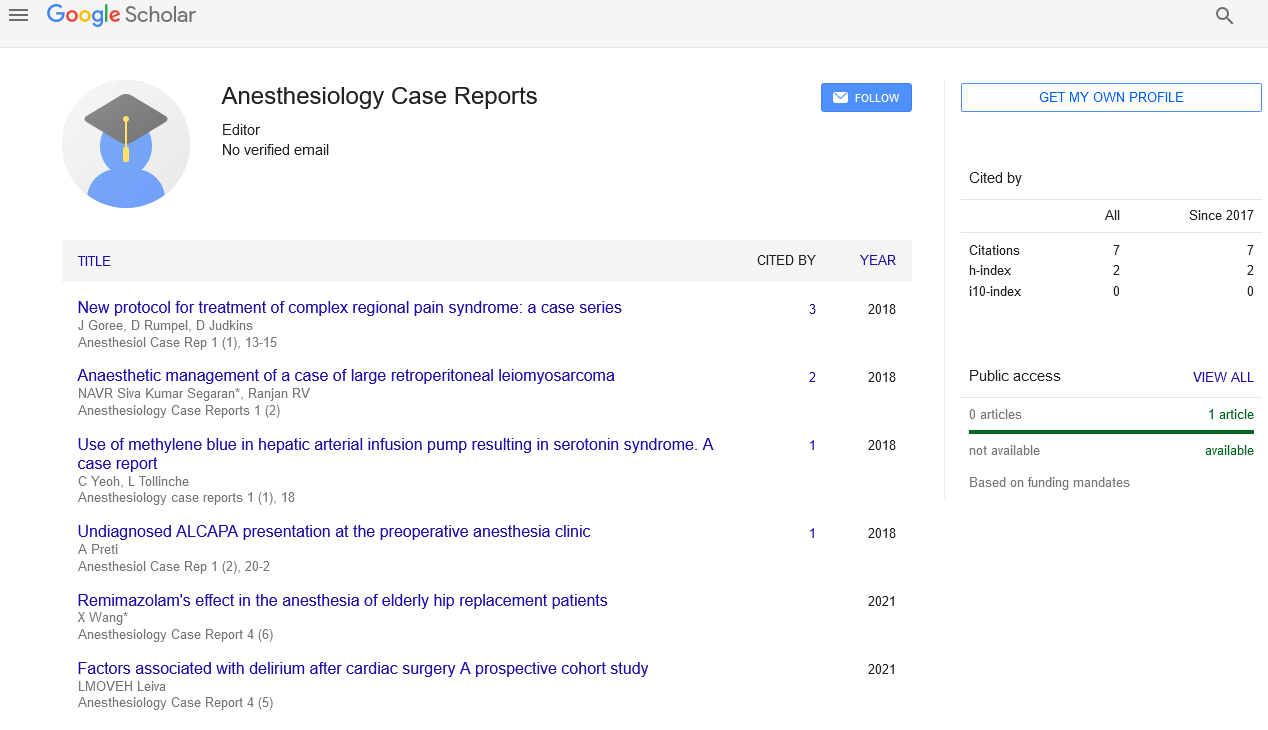Pediatric anesthesia and perioperative care
Received: 06-Nov-2021 Accepted Date: Nov 20, 2021; Published: 27-Nov-2021
This open-access article is distributed under the terms of the Creative Commons Attribution Non-Commercial License (CC BY-NC) (http://creativecommons.org/licenses/by-nc/4.0/), which permits reuse, distribution and reproduction of the article, provided that the original work is properly cited and the reuse is restricted to noncommercial purposes. For commercial reuse, contact reprints@pulsus.com
Description
Children's anesthesia management differs from that of adults in several ways, including the use of age-appropriate language, understanding the dynamics of the child's family, and determining the patient's developmental stage. As a result, in order to develop a customized anesthesia management plan, we must first understand the variability of each child's age and family-specific needs. The anesthesiologist must be aware of the stress that the patients and their families are likely to be under. The child's current medical and psychological conditions must be reviewed by the anesthesiologist.
Before or agreeing with any preoperative evaluation, anesthesiologists should obtain appropriate patient-specific information. Cardiology consultations for patients with corrected and uncorrected congenital cardiac lesions, as well as a patient with pulmonary hypertension, are examples of such consultations. Any patient with acute or chronic end-stage renal disease should see a nephrologist to see if there are any issues with fluid sensitivity or drug metabolism that need to be addressed. While patients with a well-controlled seizure disorder do not typically require changes in their anesthetic approach, any patient who has had a recent change in seizure frequency, intensity, or type of seizures should seek preoperative neurology advice. Before any major surgery, patients with bronchopulmonary dysplasia will need a preoperative pulmonary consultation, which will include pulmonary function testing. Patients on insulin should also have an endocrinology evaluation to develop an individualized plan for managing hyperglycemia or hypoglycemia before, during, or after surgery.
The goal of the preoperative anesthesia assessment is to identify clinical factors that could make a patient's perioperative clinical course more difficult. This visit also provides an opportunity to speak with the family in person, answer any questions they may have, and discuss any potential complicating factors. The anesthesiologist's job is to make the most of these encounters in order to increase the chances of surgical success. A thorough medical history and a thorough physical examination are essential. Before seeing a patient, carefully reviewing the chart can help establish a baseline understanding and should be used to confirm or update clinical diagnosis accuracy. The patient's developmental stage, special needs and dislikes, the current status of physiology and pathophysiology, and the patient and family history of anesthesia-related issues should all be addressed in each pediatric anesthesia history.
Preoperative anaesthesia care should be based on available evidence-based practise and delivered in a manner that is designed to each patient's and family's specific needs. Post-traumatic stress disorder in children is caused by poor preoperative care, which can manifest as night terrors, bedwetting, stranger anxiety, and a subsequent fear of medical personnel and buildings. The preoperative care of children should be based on a compassionate and team-based approach. It could start with a compassionate approach to the family, who are likely to have significant concerns about the anaesthetic and/or procedure. It's critical to ask questions to elicit any of these concerns. Once a risk has been identified, explanations can be given to put it in perspective and provide assurances about the surgical indication and post-operative pain management plan. Additionally, procedures that doublecheck the patient's and drug's identities, doses, routes of administration, and indications can reassure worried parents and patients. Furthermore, many parents are knowledgeable about their children's illnesses and can serve as a resource to medical personnel.





